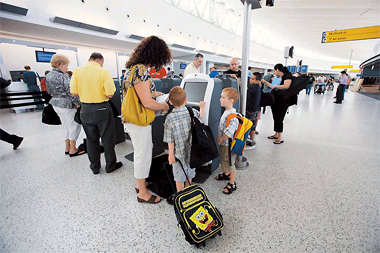|

|
|
Tara Braun uses a ticket kiosk with her two sons at John F. Kennedy International Airport in New York. Electronic methods can help travelers save both time and money.Photograph byMark Lennihan
|
Welcome to the 21st century, passengers.
Self-served ticket kiosks and other electronic screens and gadgets aren't exactly new at airports around the world, but some travelers are hesitant -- maybe a little scared -- about using them. They prefer the old-fashioned comfort of face-to-face contact with an agent, even if waiting in line slows them down.
But there are a growing number of ways to cut time and hassle out of a trip to the airport, from new kiosks to boarding passes scanned directly from your cell phone screen. There is, airports insist, no reason to be afraid.
Using electronic methods on your way to the gate can also save you money, as more airlines begin charging for contact with a living, breathing human.
Tania Ladic, a vice president of industry marketing at technology developer NCR's travel and transportation unit, said there are a number of high-tech travel aids available at nearly every step of your trip that many people may not be aware of. Here are just a few examples:
Many travelers know they can check in online, or at the airport, using a kiosk. But many don't know they can check their bags the same way. Simply pay online or at a terminal with your credit card, then drop your bags off at the "Web Bag Drop" counters available through some airlines. Nearly all airlines have a representative that will check your boarding pass, grab your bag and send you on your way.
"Right now there's a lot of confusion on what to do with checked bags (when you check in electronically)," Ladic said. "Even some of the most savvy travelers don't know this."
NCR research says that it takes about one-quarter of the time to check in for a domestic flight with a kiosk instead of a ticket agent.
Want to score a bump up to business class from coach? No sweet talk or bribes required. Most major airlines now offer upgrade opportunities, if they are available, through the Web or an airport kiosk. Payment, as with baggage, is just a swipe away. Another bonus: the kiosk never forgets to let you know when you're eligible for a promotion to more spacious seating.
Flight changes
Mechanical problems, weather delays, oversold flights -- eventually they all factor into the air travel experiences we won't soon forget. But all these problems can be made a little less troubling without ever having to wait in line for an agent. Many airlines already offer technology through their Websites, kiosks or any phone that's Web-enabled that will allow you to pick an alternate flight or cancel a reservation. Ladic said that passengers can even be notified if a delay will cause them to miss a connection so they can reschedule accordingly.
Ladic added that technology is now being developed that will send an e-mail up to several days before a flight that will notify a passenger of bad weather or other potential hold ups. Travel Websites such as Orbitz.com and some airlines already have similar alert services through text messaging and e-mail if your flight is delayed or canceled.
This is the point at which embracing technology can really help your wallet. Changing a reservation online or through a kiosk after your flight is canceled or delayed is usually free.
If you call the airline's customer service number, you will most likely be charged a fee ranging from US$15 to US$35 to speak to someone. Changes for personal reasons generally cost much more, up to US$150.
Some airlines are adding incentives to encourage the use of electronic services. In July, US Airways will start charging US$5 extra, if you pay their US$15 bag fee at the airport instead of online.
But not all carriers encourage online and electronic methods. Allegiant Air and Spirit Airlines both charge fees to buy tickets on their Websites -- US$4.9 each way for Spirit and US$13.5 per passenger at Allegiant.
Ladic said she thinks the gap is narrowing between younger and older folks when it comes to embracing technology.
Kiosks and Websites are designed to be simple and user-friendly, she said. And with a little additional encouragement from the airlines, everyone from grandma to junior will easily become more tech savvy.
Across the board, Ladic predicts that mobile phone scanning technology will be the fastest-growing platform in airport technology as more people switch from traditional paper boarding passes.
The technology is now available in several major cities -- including New York, Atlanta, Houston, Las Vegas and Boston -- but it may be slow to spread because security personnel must be taught how to read and verify boarding passes on cell phones.
Sorry to say, but there's still no electronic solution for taking your shoes off to get through security.
(Shanghai Daily June 15, 2009)